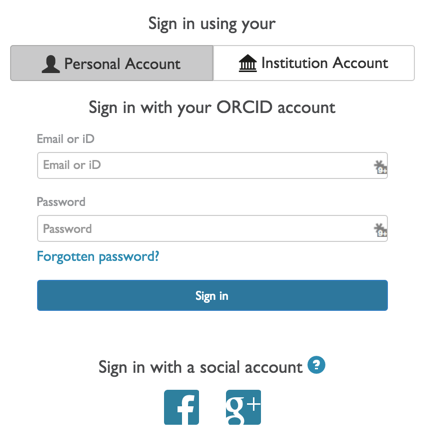Signing into the ORCID registry using institution credentials
Today we are announcing with SURF an agreement that will make the ORCID Registry available via SURFconext. This arrangement will enable Dutch researchers to access the registry using the same credentials they use to log into their university. As SURFconext is connected to eduGAIN, access to the Registry via institutional login credentials also will be available to researchers around the world at universities using eduGAIN. The work was supported by two EC funded projects, AARC and THOR.
According to ORCID’s Executive Director, Laure Haak, “This agreement and connection enables researchers in Europe and elsewhere to easily access the ORCID Registry. Connecting national and international research infrastructures, like SURFconext and eduGAIN, is a great way to deliver a better experience for researchers and administrators who have to collect and share information about research.”
Recognizing that managing many sets of sign in credentials can be cumbersome, a key goal of this project is to enable researchers to sign into the ORCID registry with credentials that they already use. While researchers will still have the ability to sign into the ORCID registry with their ORCID username and password, institutional sign in will enable Single Sign On (SSO) with other institutional resources. In addition, as part of this effort, we also will be enabling users to sign into the registry using popular social sign in credentials such as Google or Facebook.
How does it work?
 When released, all individuals signing into the ORCID registry will be presented with several options for signing in. The user may opt to sign in using an institution account or a social account (like Facebook or Google). The first time, the user will be asked to provide his/her ORCID username and password to confirm that the accounts should be linked. Once linked, the user may use either the ORCID credentials or the alternate sign in to access his/her account on the registry. If the user is already signed into an account that is associated with his/her ORCID account, no further action will be needed to gain access to the my-orcid page, or the account settings.
When released, all individuals signing into the ORCID registry will be presented with several options for signing in. The user may opt to sign in using an institution account or a social account (like Facebook or Google). The first time, the user will be asked to provide his/her ORCID username and password to confirm that the accounts should be linked. Once linked, the user may use either the ORCID credentials or the alternate sign in to access his/her account on the registry. If the user is already signed into an account that is associated with his/her ORCID account, no further action will be needed to gain access to the my-orcid page, or the account settings.
This is great! When can I use it?
In collaboration with SURF, we will be running a limited pilot to test and refine the alternate sign in functionality before releasing it to all users. According to John Doove, SURF, “Among research universities, there is strong interest in coupling ORCID iDs with implementation of Current Research Information Systems (CRIS). SURFmarket is coordinating a pilot initiative for implementation of ORCID iDs at Dutch universities. In addition to supporting local implementation of the ORCID registry, the pilot initiative provides an opportunity to explore potential for a national [Dutch] solution and the possible added value of an ORCID membership. We also will be investigating the use of ORCID iDs in publishing workflows and other research services. ” Read SURF’s blog post about this connection.
Shortly after the pilot we will open alternate sign in (including social sign in) to all users, and institutions within eduGAIN will be included as sign on alternatives. We also soon will add more details to our site that will include information about how your institution can get involved.
—
ABOUT SURF: SURF is the collaborative ICT organisation for Dutch education and research. SURF offers students, lecturers and scientists in the Netherlands access to the best possible internet and ICT facilities. SURFconext is SURFs infrastructure for online collaboration. It gives users access to a range of services through their institutional account. Federated authentication (including SSO), authorisation, group management and privacy and security agreements are organised centrally by SURF.
ABOUT eduGAIN: eduGAIN, operated by GÉANT, interconnects identity federations around the world, simplifying access to content, services and resources for the global research and education community. eduGAIN enables the trustworthy exchange of information related to identity, authentication and authorisation (AAI) by coordinating elements of the federations’ technical infrastructure and providing a policy framework that controls this information exchange. GÉANT is the pan-European research and education network that interconnects Europe’s National Research and Education Networks (NRENs). Together GÉANT connects over 50 million users at 10,000 institutions across Europe.
